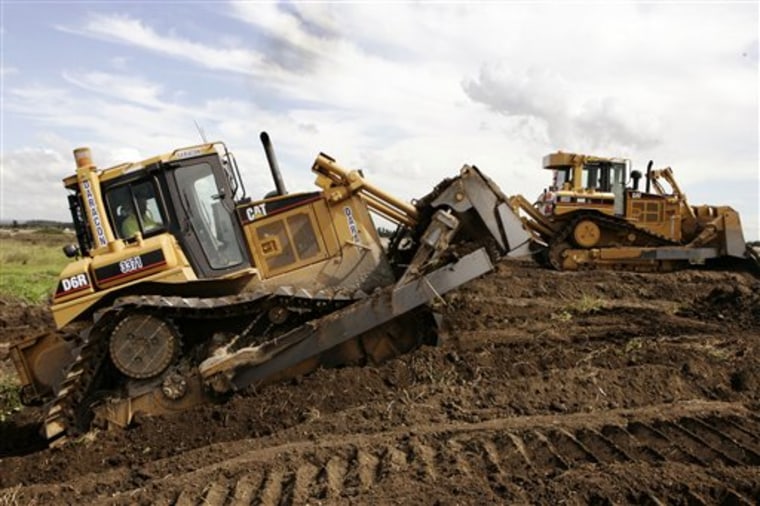Companies that ship coal, chemicals, soft drinks and purses to emerging markets like India and China appear to be snapping out of the recession faster than those that are closely tied to the U.S. and Europe.
Earnings reports out Tuesday show that sales in emerging markets are providing a glimmer of hope for both the companies and their investors. In more developed parts of the world, companies still have to rely on cost-cutting to muddle through.
Caterpillar Inc., which makes heavy equipment, raised its earnings forecast for the year because of performance in Asia, its best-performing region. Deliveries of its products in China were higher than they had ever been for the third quarter.
Other companies, including drugmaker Pfizer and handbag maker Coach, say sales are picking up in Asia, and they're rushing to add salespeople and open new stores.
Asian economies are stronger now because they adopted fiscal stimulus plans right away when their economies started to weaken, said Jay Bryson, global economist at Wells Fargo Securities.
Their economies also didn't have as much debt to unwind as the U.S., and now that lending has rebounded, they're poised to grow, he said.
"They took a hit when global trade just plunged last year, but once trade finance started to flow again, these guys were quick to recoup," he said.
John Lipsky, first deputy managing director of the International Monetary Fund, said in a speech Tuesday that Asia is set to emerge from the global slump first, even though it was among the hardest-hit because of its focus on high-tech and manufacturing.
Manufacturers, who typically export a big portion of their goods, are also benefiting from a falling U.S. dollar, which makes overseas sales more valuable, said Stephen Stanley, chief U.S. economist at RBS.
The dollar gained strength starting last year, which hurt companies with sales overseas because those sales translated to fewer dollars. But the U.S. currency has weakened recently.
"It makes it much easier if you're an exporter because the revenues you're pulling in from overseas are worth more in dollars, and (that) makes it easier to compete on a price basis," he said.
Of course, companies everywhere are still struggling with the effects of the recession. Asia managed to be Caterpillar's best-performing region with a sales decline of 26 percent.
Evidence of renewed strength in Asia was everywhere in corporate earnings reports:
- Pfizer Inc., the world's biggest drugmaker, said sales rose 9 percent in China, India and other emerging markets, excluding exchange rates. The company has been adding salespeople in China and boosting advertising there.
- DuPont Co., which makes chemical products found in everything from toys to cars and houses, said sales in China rose 7 percent during the quarter. They fell 18 percent in the U.S., Europe, Africa and the Middle East. "We've got important opportunities to penetrate that market even further," DuPont Chief Financial Officer Jeffrey Keefer said of China.
- Coal miner Peabody Energy Corp. said China's imports of coal used for steelmaking this year through August were 10 times last year's pace. India has said it may face coal shortages of 200 million tons per year by 2014, meaning it will have to import more, too.
Meanwhile, U.S. power fueled by coal has dipped 10 percent this year to date, according to Peabody, which fuels about one-tenth of the country's electricity generation.
It's not just the big manufactured goods, but the smaller ones, too. Coach Inc. reported sales of its luxury handbags rose in double digits at its Chinese stores open at least a year. That compares with a drop of 1.1 percent in the U.S.
The company plans to open 15 new locations in China this year, up from four last year. In North America, it plans 10 new stores, half as many as Coach opened each of the past two years.
And soft-drink sales may be fizzling in the U.S., but they're soaring overseas for Coca-Cola Co., which plans a $2 billion investment, along with its bottlers, in China in the next three years.
The world's largest beverage maker said Tuesday that sales outside its home turf helped profits inch higher in the third quarter. People in North America bought fewer drinks, but India recorded 37 percent growth in cases sold, while China had 15 percent more and Latin America 7 percent.
"You've got an emerging middle class that is getting more educated, and they'll be spending more money on consumer products and all kinds of products," said Edward Jones analyst Jack Russo.
